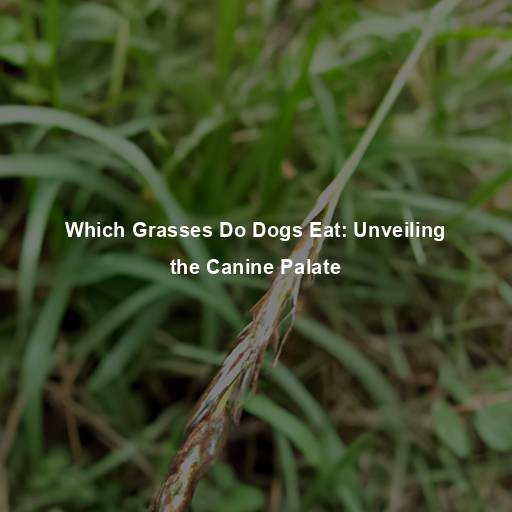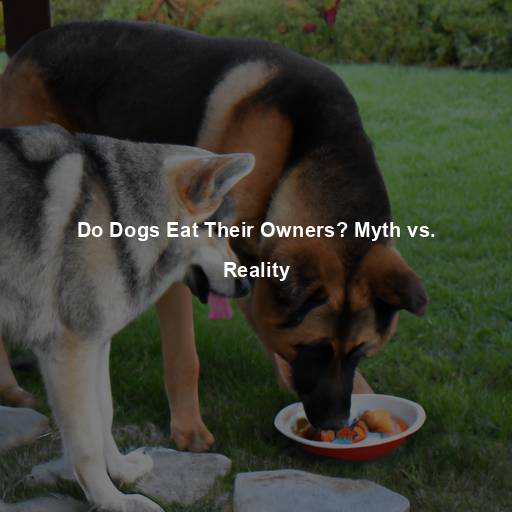Which Grasses Do Dogs Eat: Unveiling the Canine Palate
Last Updated on December 13, 2023 by Evan
Contents
- 1 Understanding the Canine Palate: Exploring Dogs’ Dietary Habits
- 1.1 The Instinctual Behavior of Grass Consumption
- 1.2 Curiosity or Nutritional Necessity?
- 1.3 Identifying Safe Grass Varieties
- 1.4 The Dangers of Toxic Grasses
- 1.5 Understanding Behavioral Reasons
- 1.6 When to Seek Veterinary Attention
- 1.7 Promoting a Healthy Lifestyle
- 1.8 Herbal Remedy Hypothesis
- 1.9 Dietary Deficiency Considerations
- 1.10 Exploring Pica Behavior
- 2 Managing Grass-Eating Behavior: Tips and Strategies
- 3 Nurturing a Safe Environment: Precautions and Considerations
- 4 The Grass-Eating Conundrum: A Fascinating Canine Quirk
- 5 FAQs for the topic: Which grass do dogs eat?
Understanding the Canine Palate: Exploring Dogs’ Dietary Habits
Dogs, our beloved four-legged companions, have a fascinating relationship with food. From slurping up their kibble to nibbling on treats, our furry friends bring joy to mealtime. However, it’s not uncommon for dogs to display a curious interest in grass. As responsible pet parents, we often wonder, “Which grasses do dogs eat”?
The Instinctual Behavior of Grass Consumption
To comprehend why dogs consume grass, we must delve into their ancestral roots. Canines, descendants of wolves, have an innate instinct to seek out plants for various reasons. In the wild, wolves consume prey that have herbivorous diets, indirectly ingesting vegetation. This behavior has been passed down through generations, leading to dogs occasionally munching on grass.
Curiosity or Nutritional Necessity?
While some dogs may chew grass out of curiosity, it’s essential to consider the nutritional aspect of their behavior. Grass is a source of fiber, which aids in digestion and can act as a natural laxative. When dogs experience an upset stomach, they may instinctively turn to grass as a means of relieving discomfort. Additionally, grass contains essential nutrients like folic acid, which can be beneficial in small amounts.
Aside from curiosity, dogs may eat grass because of boredom, dietary deficiencies, or an upset stomach. On the other hand, dog dental chews primarily aim to promote oral health by reducing plaque and tartar buildup and encouraging healthy chewing behavior. Chewing on appropriate items, like dental chews, can help alleviate boredom and provide mental stimulation, which may indirectly address behavioral issues like consuming grass out of boredom.
Identifying Safe Grass Varieties
Not all grasses are created equal when it comes to canine consumption. As responsible pet owners, it is crucial to ensure that the grass our dogs consume is safe and free from harmful pesticides or chemicals. Here are some commonly found grass varieties that are safe for dogs to nibble on:
- Bermuda Grass: This warm-season grass is often found in yards and parks. It is safe for dogs and commonly consumed without adverse effects.
When it comes to finding the ideal grass for your furry friend and your outdoor space, rye grass takes the trophy. This versatile grass, often chosen for lawns and sports fields, proves to be an excellent choice for dog lovers. With its dog-friendly attributes, rye grass will leave your pup bursting with joy and your turf looking perplexingly perfect. - Fescue Grass: With its lush appearance, fescue grass is safe for dogs and can be found in many residential areas.
Discover the captivating allure of Kentucky Bluegrass, renowned for its lush and vibrant display, making it a perennial favorite for those seeking a visually stunning landscape. But did you know that this remarkable grass also holds a delightful surprise for our furry friends? Not only does it offer an enticing feast for the eyes, but Kentucky Bluegrass is also remarkably safe for our canine companions to indulge in, making it a truly paw-some choice for both aesthetics and pet-friendly environments. Unleash the enchantment of this perplexingly versatile grass and create a harmonious sanctuary where nature’s beauty and our beloved pets can joyfully coexist.
The Dangers of Toxic Grasses
When it comes to our furry friends, not all grasses are created equal. It’s imperative to be cautious of certain varieties that can pose unintended risks to our canine companions. From potential tummy troubles to toxic threats, navigating the world of grasses can be bewildering for dog owners. To shed some light on the subject, here are a handful of grasses that should be kept out of reach for the safety and well-being of our beloved pets.
- Foxtails: Foxtails are grass-like weeds that have sharp bristles. If ingested, they can cause serious internal damage and may require immediate veterinary attention.
- Tall Fescue: While fescue grass is generally safe, tall fescue contains a fungus called endophyte that can be toxic to dogs if consumed in large quantities.
Watch out for an unexpected intruder on your lush green lawns – Dallisgrass! This peculiar grass is armed with an unusual weapon, silica, that can wreak havoc on your furry friends’ delicate digestive systems, leaving them in a state of discomfort and perplexity. Keep an eye out for these sneaky green culprits to ensure your canine companions can frolic freely without any burst of unpleasant surprises.
Understanding Behavioral Reasons
Dogs’ curious munching on grass may seem perplexing at first, but there’s more to it than meets the eye. Beyond mere nutritional needs, behavior plays a significant role in their decision to indulge in nature’s green bounty. From instinctual instincts to soothe an upset stomach to imitating their wild ancestors’ habits, our furry friends keep us guessing with their quirky grass-grazing habits. It’s just one of the many mysteries that make our canine companions so fascinating to observe.
Ever wondered why your furry friend suddenly develops a penchant for munching on grass? Well, it’s not just a random urge – boredom can be a sneaky culprit behind this perplexing behavior. When dogs aren’t adequately mentally stimulated or physically exercised, they might seek solace in the taste of grass, turning it into an impromptu form of entertainment. So, if your pooch starts grazing on your lawn, consider spicing up their routine to keep their curious minds and bodies engaged!
Dogs, the perpetual masters of seeking attention, have discovered a rather perplexing method to captivate their owners’ focus – munching on the luscious blades of grass. With an uncanny burst of curiosity, these canine attention-seekers skillfully provoke reactions and responses from their unsuspecting humans. A bizarre yet effective ploy, leaving us pondering the enigmatic depths of our furry companions’ minds.
– Coprophagia: In some cases, dogs may consume grass to induce vomiting after consuming something they shouldn’t have, such as feces or non-food items.
When to Seek Veterinary Attention
Although the occasional munching on grass usually poses no harm, there are perplexing situations that may require veterinary expertise. Should you observe any perplexing signs or symptoms such as excessive grass consumption, persistent vomiting, or unusual behavior, seeking the advice of a veterinarian is highly recommended. In such perplexing circumstances, entrusting the health of your furry friend to a professional is the burst of certainty you need. Let the experts untangle the complexities and ensure the well-being of your beloved companion.
If your furry friend is experiencing the perplexing phenomenon of recurrent vomiting following grass consumption, it may be an indication of a deeper health concern that warrants the attention of a trained professional. The burst of regurgitation after indulging in nature’s greens could be a sign for you to seek the expertise of a veterinary expert to unravel the enigmatic source of this discomfort. Let the confounding clues guide you towards the appropriate evaluation to ensure the well-being of your beloved companion.
When it comes to your furry friend’s peculiar eating habits, things can take an unexpected turn. If your dog’s affinity for grass seems to have reached new heights or is accompanied by a confluence of worrying signs, it’s crucial to turn to the experts for guidance. Reach out to your trusted veterinary professional to unravel the enigma and ensure your canine companion’s well-being.
When your furry friend starts devouring grass like there’s no tomorrow or becomes oddly fixated on it, it’s time to dig deeper into the root of the issue. Don’t just brush it off as a quirky habit, as there may be an underlying cause that needs attention. Explore the myriad of possibilities that could be fueling this perplexing behavior, and take proactive steps towards finding a solution. Your dog’s health and well-being, after all, deserve more than just a puzzled shrug.
Promoting a Healthy Lifestyle
To ensure our furry friends lead a healthy lifestyle, it’s important to provide them with a well-balanced diet, regular exercise, and mental stimulation. Here are some tips to promote a happy and healthy life for your canine companion:
- Quality Nutrition: Opt for high-quality dog food that meets your dog’s specific nutritional requirements. Consult with your veterinarian to determine the best diet for your furry friend.
- Regular Veterinary Check-ups: Schedule routine check-ups to monitor your dog’s overall health and catch any potential issues early on.
Keeping your furry friend fit and happy is a top priority. Incorporating regular physical exercise into your dog’s routine is not only beneficial for their overall health, but also for their mental wellbeing. Daily walks, interactive playtime, and engaging toys can provide the burst of activity and entertainment your dog needs to stay in tip-top shape. So lace up those sneakers, grab a leash, and embark on an adventure that will make both you and your four-legged companion happy and perplexed in the best possible way. - Mental Stimulation: Provide your dog with mental stimulation through puzzle toys, training sessions, and interactive games. Mental exercise is just as important as physical exercise for a well-rounded canine.
Herbal Remedy Hypothesis
One theory suggests that dogs may instinctively consume grass as a form of self-medication. It is believed that certain grasses contain medicinal properties that can help alleviate minor ailments or aid in digestion. However, further research is needed to validate this hypothesis and understand the specific benefits that grass may provide.
Dietary Deficiency Considerations
Another speculation revolves around dietary deficiencies. Some experts argue that dogs may seek out grass to compensate for missing nutrients in their regular diet. While grass does contain certain vitamins and minerals, it is unlikely to fulfill all of a dog’s nutritional requirements. Providing a balanced and nutritious diet tailored to their specific needs remains crucial.
Exploring Pica Behavior
There’s a peculiar quirk in the world of dogs – the act of consuming non-edible objects, known as pica. Interestingly enough, this unique behavior has a connection to the grass-eating tendencies of our furry friends. While some dogs engage in pica due to medical reasons like tummy troubles or nutritional imbalances, it’s always wise to consult a trusted veterinarian to delve into the mysteries behind this perplexing behavior and find the best solution for your four-legged companion.
Managing Grass-Eating Behavior: Tips and Strategies
As pet lovers, we often find ourselves in a quandary when it comes to our furry friends nibbling on grass. While it’s usually no cause for concern, there might be times when we’d like to take a more proactive approach in curbing this behavior. Don’t worry, we’ve got you covered! Here are a few tried-and-true tips and strategies that you can consider implementing to keep your pets away from the green stuff when necessary.
Provide Alternative Chewing Options
To redirect your dog’s grass-eating behavior, offer appropriate chewing alternatives. Provide them with durable chew toys or dental chews that are specifically designed for dogs. This can help satisfy their need to chew and divert their attention away from grass.
Dog dental chews are excellent chewing options. They promote oral health by decreasing tartar buildup on the teeth, preventing issues like periodontal disease and bad breath. These chews also satisfy a dog’s natural chewing instinct in a safe and controlled manner, providing relief during teething in puppies.
The act of chewing on these treats offers entertainment and mental stimulation, reducing boredom and prevent destructive chewing behaviors. Some dental chews are formulated with additional ingredients that contribute to overall health, such as vitamins, minerals, or supplements for joint health. They are designed to be easily digestible, minimizing the risk of choking or causing gastrointestinal blockages.
With various shapes, sizes, and flavors available, dental chews cater to different preferences and chewing styles. It’s crucial to offer them in moderation as part of a well-balanced diet and choose products appropriate for the dog’s size, age, and specific dental health needs. Regular monitoring during chewing is advised, and consulting with a veterinarian for guidance on dental care is recommended.
Ensure a Balanced Diet
When it comes to managing your furry friend’s grass-eating tendencies, the key lies in offering a wholesome and nourishing meal plan. Collaborating with your trusted veterinarian is crucial to tailor a diet that caters to your dog’s unique nutritional needs. By providing a balanced and complete diet, you can address any hidden deficiencies that might be prompting your pup’s craving for greens. Embrace the perplexing world of canine nutrition and tackle grass consumption head-on.
Environmental Enrichment
Keeping your furry friend entertained and mentally challenged is key to curbing their curiosity-induced grass-snacking habit. Transform their playtime into a captivating experience by introducing interactive toys, setting up exciting obstacle courses, or diving into engaging training sessions. This way, you’ll keep their minds captivated and their bodies bustling with energy, ensuring they’re satisfied and satiated.
Supervise Outdoor Time
When allowing your dog outdoor access, it’s essential to supervise their activities, especially if they have a habit of eating grass. Keep a close eye on them and redirect their attention if you notice them nibbling on grass. By being vigilant, you can discourage grass consumption and ensure their safety.
Consult with a Professional
If your dog’s grass-eating behavior becomes excessive, obsessive, or is accompanied by other concerning symptoms, it may be beneficial to seek the guidance of a professional. A certified dog behaviorist or a veterinarian specializing in behavioral issues can provide tailored advice and strategies to address the underlying cause of the behavior.
The Influence of Pack Mentality
Dogs, those captivating creatures of immense sociability, possess an unwavering allegiance to the principles of pack dynamics. Fascinatingly enough, their proclivity for indulging in verdant feasts of grass might just originate from the simple act of keenly observing fellow canines or other members of the animal kingdom partaking in this particular gastronomic ritual. It seems that our four-legged companions are not only masters of companionship but also astute imitators, diligently mirroring the behaviors they behold within their pack or immediate environment. Thus, if your beloved furry companion happens upon the sight of their fellow barkers delightfully munching on nature’s emerald carpet, it might just compel them to join in on this enigmatic botanical banquet.
Addressing Potential Health Concerns
While grass consumption is typically harmless, it’s crucial to monitor your dog’s behavior for any signs of distress or health issues. Excessive grass-eating, frequent vomiting, or unusual changes in behavior may indicate an underlying problem that requires veterinary attention. It’s always better to err on the side of caution and consult with a professional if you have concerns about your dog’s health.
Nurturing a Safe Environment: Precautions and Considerations
Avoiding Harmful Chemicals
When it comes to our furry friends munching on grass, we all want to keep them safe and sound. Ensuring that the green goodness they nibble on is free from any harmful chemicals is of utmost importance. Beware of the lurking dangers in pesticides, herbicides, and fertilizers that are commonly applied to lawns, as these can pose a serious threat to your dog’s well-being if accidentally ingested. As a diligent dog owner, opt for the natural and organic route when it comes to caring for your lawn, to minimize the potential risks and keep your pup bursting with vitality.
Creating a Dog-Friendly Yard
Transforming your yard into a haven for your furry companion requires a thoughtful approach, prioritizing their safety and happiness. Craft a designated space tailored to their needs, steering clear of any potentially hazardous elements like toxic plants or harmful substances. Infuse innovative landscaping ideas that cater to your canine’s instincts, such as pet-friendly grass variants or designated play areas, offering them an enriching outdoor experience.
Training and Behavioral Modification
If your dog’s grass-eating behavior becomes a concern or poses a risk to their health, working with a professional dog trainer or behaviorist may be beneficial. They can help identify the underlying cause of the behavior and develop training techniques or behavioral modification strategies to redirect your dog’s focus away from grass consumption.
The Grass-Eating Conundrum: A Fascinating Canine Quirk
Embracing Individuality and Diversity
As proud guardians of our beloved pets, it’s crucial to honor and appreciate the idiosyncrasies they bring into our lives. Although the act of munching on grass may baffle us occasionally, it serves as a poignant reminder of the remarkable individuality and vast array of characteristics exhibited by our four-legged companions. Every dog flaunts their distinct inclinations, innate instincts, and peculiar habits, rendering them utterly captivating and bewitching creatures.
The Joy of Canine Companionship
Ultimately, the grass-eating conundrum is just one aspect of the incredible bond we share with our dogs. It’s a reminder of the joys and challenges that come with being a pet parent. Through our love, care, and understanding, we can navigate the intricacies of their behaviors and provide them with a fulfilling and happy life.
FAQs for the topic: Which grass do dogs eat?
Can dogs eat grass?
Yes, it is very common for dogs to eat grass. Many pet owners find their dogs grazing on grass from time to time. It is generally considered a normal behavior, and most dogs do not experience any negative effects from eating grass.
Why do dogs eat grass?
The captivating mystery of why dogs have an affinity for grass remains an enigma. Despite countless speculations, the perplexity surrounding dogs munching on this verdant foliage continues to baffle experts. Some suggest that dogs devour grass as a means to induce regurgitation, a peculiar practice to relieve their tormented tummies. While others propose a simpler theory – could it be that dogs are enchanted by the tantalizing taste and texture of this chlorophyll-filled feast? Alternatively, could it be out of sheer boredom or perhaps an attempt to replenish certain nutritional shortfalls? The complexities of a dog’s grass-eating habits persist, defying our quest for a clear-cut explanation.
Is it safe for dogs to eat grass?
In most cases, it is safe for dogs to eat grass. However, it is important to ensure that the grass your dog consumes has not been treated with any pesticides, fertilizers, or other harmful chemicals. These substances can be toxic to dogs and cause adverse reactions. It is also important to supervise your dog while eating grass to prevent them from consuming other potentially hazardous objects that may be hidden in the grass.
What types of grass are safe for dogs to eat?
When it comes to the lush carpets of green that adorn our yards and parks, there is a multitude of grass varieties that dogs seem to have an insatiable curiosity for. Perennial ryegrass, Kentucky bluegrass, and Bermuda grass are among the top contenders in this grassy feeding frenzy. However, the perplexing predicament arises when we consider the potential hazards posed by chemically-treated grasses. To navigate this conundrum, seeking the sage advice of a knowledgeable veterinarian can provide much-needed clarity and peace of mind.
Is eating grass normal for dogs?
Yes, eating grass is considered a normal behavior for dogs. Many dogs instinctively eat grass as part of their natural instincts. However, if you notice your dog eating an excessive amount of grass or showing signs of digestive issues after eating grass, it is recommended to consult with your veterinarian to rule out any underlying health concerns.
Will eating grass harm my dog?
While it may seem perplexing, rest assured that your furry friend’s grass-eating frenzy is often harmless. However, it’s important to note the bursts of risk that come with this seemingly innocent behavior. From the potential exposure to unsavory chemicals to the ingestion of foreign objects hiding among the blades, there are murky uncertainties to consider. Should your dog devour an excessive amount of grass and encounter digestive upheaval like vomiting, persistent discomfort, or the dreaded diarrhea, seeking veterinary guidance becomes imperative to untangle any hidden health conundrums.
Should I prevent my dog from eating grass?
Unless your dog exhibits negative reactions or health issues related to eating grass, there is generally no need to prevent them from doing so. However, it is essential to provide a safe environment for your dog to graze, ensuring the grass is free from harmful substances and objects. If you have concerns about your dog’s grass-eating behavior, it is always best to consult with your veterinarian for personalized guidance and advice.







